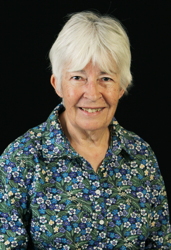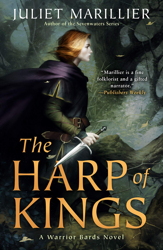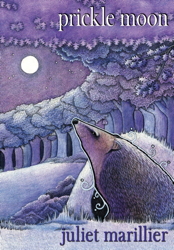
I celebrated my 60th birthday near the end of July, and every year I’m always delighted to be reminded that I share that birthdate with a number of other writers including E. Catherine Tobler (who’s up for two World Fantasy Awards this year), Kate Elliot (who I’m hoping to lure to this blog early next year ), and this week’s EATING AUTHOR guest, Juliet Marillier.
She was born in New Zealand but resides in a suburb of Perth, in Western Australia where she divides her time between caring for a crew of rescue dogs and writing. As much as I’d like to go off on a tangent about the rescue dogs, this blog is about writing, so let’s focus on that. Juliet writes historical fantasy for adult and young adult readers, at both novel and short fiction length. She credits her lifelong love of mythology and folklore as a major influence on her writing. Her work has won her five Aurealis Awards, four Sir Julius Vogel Awards, three Tin Duck Awards, as well as the American Library Association’s Alex Award, the Prix Imaginales, and the Sara Douglass Book Series Award.
Juliet’s newest series is Warrior Bards, and Book One, The Harp of Kings, comes out on September 3rd. C’mon, it’s got undercover, traveling ministrels, what more could you want?

LMS: Welcome, Juliet. Please, would you tell me about your most memorable meal?
JM: In 2006 I travelled to Romania accompanied by one of my sons as driver/minder. At that point I was writing Wildwood Dancing, a novel based on a combination of two fairy tales, The Twelve Dancing Princesses and The Frog Prince. My story was set in Transylvania and featured a group of sisters (five, not twelve) who find themselves looking after their father’s trading business when he is taken sick far from home. Alongside their struggles with an avaricious cousin and the prejudices of a male-dominated society, they must also conceal the secret of their full moon visits to a magical kingdom deep in the forest.
Having decided that Transylvania, with its wooded hills and ancient castles and its rich folklore, was the perfect setting for this story, I wanted to make everything as accurate as I could — not only the history and geography, but also the traditions and old stories of that region. Reference books and online research can take you only so far. So we made our way via Bucharest to Transylvania, accompanied by a Romanian guide who specialised in history. One of the first things he said when he learned I was writing a historical fantasy set in Transylvania was, ‘Don’t include cliché vampires.’ I did my best to avoid them.
Our guide took us off the beaten track to some fascinating places. A lot of quirky details found their way into my book. For instance, the village cows, which belong to individual households, are collected and taken out to graze every morning by a designated cowherd and brought back in the early evening. Each cow knows the high wooden gate of its home and heads off on its own to be let in by the householder. It was harder to get local people to talk about folk traditions and practices involving the uncanny; I think I would have needed to stay longer and earn people’s trust before they would consider opening up about such mysteries.
One memorable experience involved food. Our guide took us to visit some of his extended family who lived in a traditional village. House, barn and workshop were grouped around an open area which I remember as quite muddy from recent rain. They provided us with lunch set out on a long outdoor table. It was clear we were considered honoured guests, and when I gave our guide a gift I had brought from Australia (an outfit for his new baby) our hostess responded with a beautiful piece of local pottery which I managed to bring home intact in my suitcase.
The meal was clearly the result of much work on our hosts’ behalf. It was also rich with foodstuffs challenging to my palate. Warm unpasteurised milk fresh from the family cow, offered as a special treat. Spicy home-made sausages containing several types of meat. Mămăligă, which is a polenta dish topped with melted cheese and often featuring a layer of whipped cream over the cheese — great fuel if you’re about to head out for a hard day’s work in the fields, especially in a cold climate. To finish, some delicious doughnut-like pastries dusted with sugar. Our generous hostess put some of these in a bag for us to take back to our accommodation. And of course we couldn’t leave without sampling ţuică, the local plum brandy. Everything on that table was either made on this couple’s own property or somewhere in their village. Even more striking than that was the warmth and generosity of our hosts to these complete strangers from the other side of the world. Perhaps that day we learned something about the true heart of Transylvania.

Thanks, Juliet. My maternal grandmother used to make mămăligă, but it was the Romanian version (not the kind made by vampiric farmers and travel guides).
Next Monday: Another author and another meal!
Want to never miss an installment of EATING AUTHORS?
Click this link and sign up for a weekly email to bring you here as soon as they post.
#SFWApro
Tags: Eating Authors


